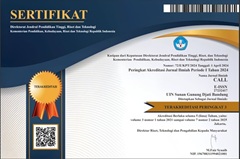AN INVESTIGATION OF REQUESTING SPEECH ACT IN “SERI PENDALAMAN MATERI BAHASA INGGRIS FOR XII GRADE†ENGLISH TEXTBOOK
DOI:
https://doi.org/10.15575/call.v2i2.9310Abstract
This study examines the types of requesting strategies that occur in the English textbook and investigate the context of the dialogues in the textbook. This research employed qualitative content analysis approach. The data were utterances, in the form of sentences, clauses or words that appears in the textbook, while the contexts of the data were the dialogues. Data were obtained through document analysis consisted of nine request strategies. The data were analyzed by determining the request strategies based on Trosborg‘s theory (1995), and context of situation theory by Holmes (2001). The result shows that there are eight strategies of requesting found within the textbook. The types that appears most frequently within the textbook is questioning ability/willingness and the slightest showing up is mild hints and suggestory formulae. A few sorts are also found such as, imperatives, demands/needs, wish, permissions, and strong hints. The data showed, understanding speech acts also means understanding how language is used and practiced or, in other words understanding the context. Thus, misunderstanding and misinterpretation can be minimized.
Keywords: Requesting, Speech Act, Context of Situation, Textbook
Downloads
Additional Files
Published
Issue
Section
Citation Check
License
Authors who publish in CALL agree to the following terms:
- Authors retain copyright and grant the journal right of first publication with the work simultaneously licensed under Attribution-ShareAlike 4.0 International (CC BY-SA 4.0) License that allows others to share the work with an acknowledgment of the work's authorship and initial publication in this journal.
- Authors are able to enter into separate, additional contractual arrangements for the non-exclusive distribution of the journal's published version of the work (e.g., post it to an institutional repository or publish it in a book), with an acknowledgment of its initial publication in this journal.
- Authors are permitted and encouraged to post their work online (e.g., in institutional repositories or on their website) prior to and during the submission process, as it can lead to productive exchanges, as well as earlier and greater citation of published work (See The Effect of Open Access).




